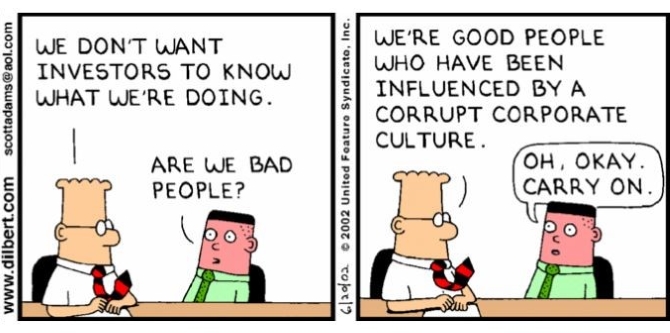Giving people freedom over ethical choices at work
Rather than prescribing ethical behaviour, let's encourage an open conversation about personal beliefs, values and their impact on day-to-day decisions
Rather than prescribing ethical behaviour, let's encourage an open conversation about personal beliefs, values and their impact on day-to-day decisions
It’s becoming more and more apparent that the way people behave only loosely relates to formal procedures and regulations. Plenty of organisations that explicitly state their values and decry unethical practice in their codes of conduct have been exposed for the very same behaviours. Their executives were found to pursue financial gains at the expense of the workforce, customer, or community interests. At the same time, there is no ‘rule’ to help someone struggling with a large suitcase up the stairs, but many of us would offer to step in any way out of good nature or compassion.
So, if compliance can go only so far in preventing malpractice, how can societies and organisations encourage people to make positive choices when no one is looking? In one of the CIPD’s latest surveys, Employee Outlook, we asked individuals a number of questions about their own choices at work, as well as about the values of colleagues working around them and the organisational culture more generally. The responses were collected by YouGov from a sample of around 1,800, representative of the UK working population in Spring 2016.
First, how widespread is unethical practice? About 1 in 7 employees agreed that they would exaggerate the truth about their company’s products/services to customers and clients if it helped their organisation. Still, 56% believed it important to give accurate information to customers and clients, even if it was damaging to the business.
Tolerance towards misrepresenting the company was highest in the private sector where only 6 in 10 were against exaggerating their company’s services, compared to 7 in 10 in public and voluntary sectors. Senior managers were also more likely to agree with this practice, compared to staff without managerial responsibility. Of course, these figures are based on self-reported data, and so are open to respondents over or understating what they would actually do in practice. Yet, it provides an indication of the overall trends in ethical behaviour.

Secondly, we explored the links between individuals overstating their company’s promises and organisational culture. Reported dishonesty was higher in environments that allowed ignoring formal procedures and rules if it helped get the job done, as well as cultures that encouraged personal success and individual achievement.
A more unexpected factor associated with corporate dishonesty was loyalty to one’s organisation. In the CIPD survey, respondents who agreed that they would do whatever it took to help their organisation (even if it meant sacrificing their personal needs and interests) were also more likely to say they would misrepresent their company’s products and services to help the business outcome. These individuals also expressed more confidence and trust in the senior leadership, and were more motivated by their organisation’s core purpose.
The findings raise questions about the mechanisms available to organisations to support ethical practice of their staff. Understandably, businesses are interested in enhancing performance. Yet, many of them would at the same time strive to eliminate behaviours that risk company’s reputation in the long-term. Clearly, formal policies and incentives can be trumped by the prevalent informal norms. Even organisational loyalty – often seen as a positive contributor to employee performance – can lead individuals to lose sight of the impact that their decisions to pursue business outcomes have on customers and wider society.
So, what can organisations do instead? For me, the traditional approaches put too much emphasis on preventing the risks of unethical practice, and, therefore, resort to agreeing and enforcing a single definition of the organisation’s ethical position. No doubt, the purpose of this ‘corporate line’ is to achieve clarity and consistency of desired behaviours. However, by the time it reaches everyone in the business, the well-intentioned sentiment is boiled down to a few narrow bullet points that do not reflect the real-life complexity of ethical choices. Moreover, it provides an opportunity to deflect responsibility to ‘doing as you are told’ by the formal rules, rather than thinking through the possible courses of action.
An alternative to these control-based approaches would be to loosen the reins, and – rather than prescribing the norms of ethical behaviour – encourage an open and unprejudiced conversation about people’s personal beliefs and values, and their impact on the day-to-day decisions. While daunting at first, it is more likely to surface the true drivers of unethical behaviour; and foster accountability for ethical choice, both to ourselves and our immediate colleagues, rather than faceless company values.
By Ksenia Zheltoukhova:
Browse our A–Z catalogue of information, guidance and resources covering all aspects of people practice.
Discover our practice guidance and recommendations to tackle bullying and harassment in the workplace.

Listen to our new fortnightly podcast providing expert insights from HR leaders on the topical issues impacting the world of work
Listen now
Dedicated analysis of job quality and its impact on working lives in Scotland

Explore the CIPD’s point of view on responsible business, including recommendations for employers

This research outlines recommendations for making feedback discussions more constructive

Monthly round-up of changes in employment law in the UK

Research on how an employee's socioeconomic background or class affects their development opportunities and how to maximise social mobility in the workplace

We look at the main focus areas and share practical examples from organisations who are optimising their HR operating model

Ben Willmott explores the new Labour Government strategies to enhance skills and employment to boost economic growth